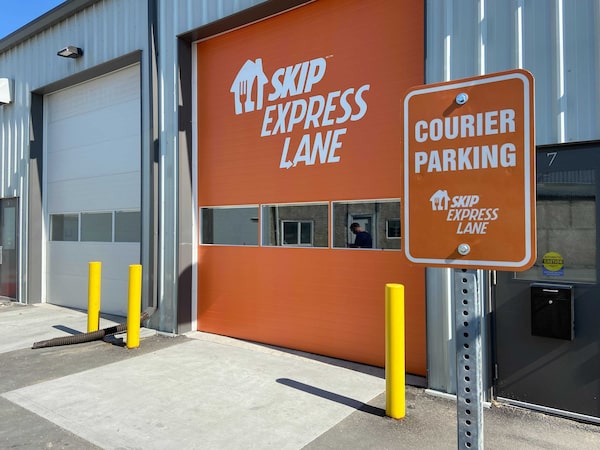
The Winnipeg-based restaurant delivery service is planning to build 38 warehouses across the country over the next year, as it launches a home delivery service for convenience-store and grocery items.Courtesy of Skip the Dishes
Like most e-commerce businesses, Winnipeg-based SkipTheDishes saw demand for its restaurant delivery service spike during the pandemic. But there was one corner of the platform that, while small, experienced outsized growth.
In addition to working with restaurants, the platform provides delivery for convenience stores such as 7-Eleven. As of April of 2020, SkipTheDishes was handling roughly 20,000 such orders each month. Fast forward 20 very unusual months, and that number is now nearly 400,000.
Now, the company is becoming the latest competitor in an increasingly crowded marketplace for delivery of groceries and other household items. By mid-2022, SkipTheDishes is planning to build 38 “dark stores” – another name for retail locations that fill e-commerce orders only. It has already launched four such locations under the name Skip Express Lane, buying its own inventory to deliver items such as milk and eggs, pantry staples and snacks.
“We think online grocery has a potential of about $120-billion in Canada,” chief executive officer Kevin Edwards said, speaking of overall sales. “Could the grocery category grow to be a significant part of our business? Yes, we believe it can.”
E-commerce is currently a very small slice of Canada’s grocery market. And while estimates vary on just how big grocery e-commerce will be – Stifel GMP analyst Martin Landry estimated in a research note last month that annual sales would reach $25-billion by 2025 – there is no question that it is growing.
In an Angus Reid survey of 1,503 Canadians conducted on Dec. 3, 19 per cent said they had ordered groceries online in the past month, with 10 per cent paying for home delivery and the rest choosing curbside “click-and-collect” pickup at a store.
“You’re starting to see the conversion, more people opting for delivery as opposed to curbside,” said Sylvain Charlebois, director of the Agri-Food Analytics Lab at Dalhousie University in Halifax, noting that number has increased in Angus Reid’s survey since this past summer.
Unlike the free delivery with minimum purchases that are the norm for e-commerce players such as Amazon, grocery retailers generally charge delivery fees that can range from $6 to $12 or more, depending on the location and the day. SkipTheDishes is hoping to compete by offering free delivery for orders over $25, or a fee of $1.99 to $3.99 for smaller orders.
The trade-off is that its service offers a slimmer selection: Its micro-fulfilment centres average around 5,000 square feet and stock more than 1,500 items each. By comparison, Sobeys owner Empire Co. Ltd. built a 250,000-square-foot warehouse for its Voilà e-commerce service in the Greater Toronto Area, with a capacity for nearly 40,000 items. SkipTheDishes is aiming to fill orders more quickly from smaller operations located close to shoppers’ homes, offering delivery within half an hour.
But while the service is aiming to stick close to grocery-store prices, it means that shoppers may not always find items at prices as low as an order from a larger grocer. Mr. Edwards said the service is an option for customers who may not feel they can justify paying a delivery fee if they need only a few items. He said the company is also working on building relationships with suppliers to offer more options in the future.
“We are going to be an important offering in university towns or areas where singles are more abundant. … We also see ourselves being that top-up for families and larger households as well,” he said
In an investor presentation in October, SkipTheDishes’s parent company, Amsterdam-based Just Eat Takeaway.com NV, noted that this type of delivery service can “smooth” out the peaks and valleys of demand for restaurant delivery at different times of day. The company, which also owns delivery services such as Just Eat and Grubhub, reported Canadian revenue equivalent to roughly $457-million in the first half of this year on 57 million orders, but noted that caps on restaurant delivery commissions have affected profitability. Mr. Edwards said the decision to launch its
Express Lane service was not related to that issue, but is a response to consumer demand.
The company began testing the service in Winnipeg in July, followed by London, Ont., in August, and opened two locations in Toronto on Monday. It is currently testing out offering fresh produce at its Winnipeg location, with hopes to expand.
SkipTheDishes is not alone in angling for a piece of this market. Last month, meal-kit company Goodfood Market Corp. announced the launch of a one-hour grocery delivery service in high-density markets, starting with Toronto and Montreal.
Your time is valuable. Have the Top Business Headlines newsletter conveniently delivered to your inbox in the morning or evening. Sign up today.
 Susan Krashinsky Robertson
Susan Krashinsky Robertson